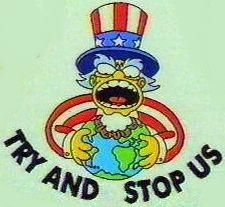UN panel to frame guidlines for legality of pre-emptive stikes
Members of an international panel studying United Nations' operations say the group hopes to lay down clear rules declaring when it is legal for a nation to use pre-emptive military force in its own defense.
The issue grows out of the international controversy over the Bush administration's decision to invade Iraq without a final U.N. Security Council resolution explicitly authorizing the war, said panel member Gareth Evans, a former foreign minister of Australia.
"I expect the panel to be giving close consideration to what those rules are and how they should be applied and whether an effort should be made to identify generally agreed criteria for the legitimate use of force, whatever the context," Mr. Evans said during a recent appearance at the Woodrow Wilson International Center for Scholars in Washington.
He made his remarks before last week's presidential debate in which Democratic nominee Sen. John Kerry's call for a "global test" on when pre-emptive action is justified became a campaign issue.
U.N. Secretary-General Kofi Annan established the 16-member High-Level Panel on Threats, Challenges and Change in November to study ways to reform the 59-year-old organization so it can better address 21st-century threats to security and peace.
But Mr. Evans, currently president of the International Crisis Group think tank, said much of the panel's work has focused on establishing detailed guidelines for the use of military force.
"A central reason for our appointment was concern that the U.N., and indeed the whole multilateral security system, was really at a crossroads with the resurgence of unilateralism from you know whom, and increasing willingness to bypass the Security Council," Mr. Evans said in a clear reference to the Bush administration.
The lone American on the panel, retired Gen. Brent Scowcroft, voiced surprise at Mr. Evans decision to discuss the panel's work publicly and said it was premature to conclude what will be in the final report.
Nevertheless, Gen. Scowcroft said he does not expect that the panel's recommendations will rule out pre-emptive military action.
"I think if we end up dealing with the issue of pre-emption I would speculate that there will not be an attempt to ban it but an attempt to define and set parameters and guidelines," said Gen. Scowcroft, a former national security adviser to President Ford and the first President Bush.
The legality of pre-emptive action has been at issue since Mr. Annan told a British Broadcasting Corp. interviewer last month that he considered the invasion of Iraq to be "illegal" within the context of the U.N. system.
President Bush defended his decision in an address to the U.N. General Assembly on Sept. 21, citing a series of U.N. resolutions passed prior to the war that promised "serious consequences" if Iraqi dictator Saddam Hussein failed to disarm.
Mr. Kerry, during his debate with Mr. Bush on Thursday, said he supported the right of a president to order a pre-emptive strike but that it must pass "the global test where your countrymen, your people, understand fully why you're doing what you're doing, and you can prove to the world that you did it for legitimate reasons."
Mr. Bush countered the next day that this would give foreign governments a veto over U.S. national security decisions.
Secretary of State Colin L. Powell, in an interview at The Washington Times last month, stressed that the U.S. Constitution authorizes the United States to act in its own self-defense without U.N. approval.
Even so, he said, the Iraq war was justified based on Saddam Hussein's numerous "material breaches" of U.N. resolutions on his weapons programs. "What we did was totally consistent with international law," Mr. Powell said.
Asked about a Russian claim that it has a right to act pre-emptively against terrorism anywhere in the world, Mr. Powell said such action "is part of the inherent right of self-defense" enjoyed by every country.
But, he said, "You'll have to make your case — once you've pre-empted something — to the world and to your own people that it was the right thing to do."
The U.N. charter authorizes the use of military force by member nations acting in "self-defense if an armed attack occurs" or when approved by the Security Council.
The U.N. panel is expected to submit its report to the secretary-general Dec. 1. Mr. Annan will decide whether the report will be made public.
Besides its recommendations on military force, the group is expected to call for changes to the Security Council's makeup. Mr. Evans said the panel has discussed recommending that several new countries be granted membership. Currently, all five permanent members have veto power.
"If you want the Security Council to be credible with the world as a whole, it has to reflect the world as a whole," he said.
A major impetus for improving the U.N. system, Mr. Evans said, is to ensure that the United States remains an active participant.
"The exercise is really to make the U.N. work so well in these areas that the U.S. won't be tempted, or tempted as often, to walk away from the system," Mr. Evans said.
By Heather J. Carlson THE WASHINGTON TIMES
The issue grows out of the international controversy over the Bush administration's decision to invade Iraq without a final U.N. Security Council resolution explicitly authorizing the war, said panel member Gareth Evans, a former foreign minister of Australia.
"I expect the panel to be giving close consideration to what those rules are and how they should be applied and whether an effort should be made to identify generally agreed criteria for the legitimate use of force, whatever the context," Mr. Evans said during a recent appearance at the Woodrow Wilson International Center for Scholars in Washington.
He made his remarks before last week's presidential debate in which Democratic nominee Sen. John Kerry's call for a "global test" on when pre-emptive action is justified became a campaign issue.
U.N. Secretary-General Kofi Annan established the 16-member High-Level Panel on Threats, Challenges and Change in November to study ways to reform the 59-year-old organization so it can better address 21st-century threats to security and peace.
But Mr. Evans, currently president of the International Crisis Group think tank, said much of the panel's work has focused on establishing detailed guidelines for the use of military force.
"A central reason for our appointment was concern that the U.N., and indeed the whole multilateral security system, was really at a crossroads with the resurgence of unilateralism from you know whom, and increasing willingness to bypass the Security Council," Mr. Evans said in a clear reference to the Bush administration.
The lone American on the panel, retired Gen. Brent Scowcroft, voiced surprise at Mr. Evans decision to discuss the panel's work publicly and said it was premature to conclude what will be in the final report.
Nevertheless, Gen. Scowcroft said he does not expect that the panel's recommendations will rule out pre-emptive military action.
"I think if we end up dealing with the issue of pre-emption I would speculate that there will not be an attempt to ban it but an attempt to define and set parameters and guidelines," said Gen. Scowcroft, a former national security adviser to President Ford and the first President Bush.
The legality of pre-emptive action has been at issue since Mr. Annan told a British Broadcasting Corp. interviewer last month that he considered the invasion of Iraq to be "illegal" within the context of the U.N. system.
President Bush defended his decision in an address to the U.N. General Assembly on Sept. 21, citing a series of U.N. resolutions passed prior to the war that promised "serious consequences" if Iraqi dictator Saddam Hussein failed to disarm.
Mr. Kerry, during his debate with Mr. Bush on Thursday, said he supported the right of a president to order a pre-emptive strike but that it must pass "the global test where your countrymen, your people, understand fully why you're doing what you're doing, and you can prove to the world that you did it for legitimate reasons."
Mr. Bush countered the next day that this would give foreign governments a veto over U.S. national security decisions.
Secretary of State Colin L. Powell, in an interview at The Washington Times last month, stressed that the U.S. Constitution authorizes the United States to act in its own self-defense without U.N. approval.
Even so, he said, the Iraq war was justified based on Saddam Hussein's numerous "material breaches" of U.N. resolutions on his weapons programs. "What we did was totally consistent with international law," Mr. Powell said.
Asked about a Russian claim that it has a right to act pre-emptively against terrorism anywhere in the world, Mr. Powell said such action "is part of the inherent right of self-defense" enjoyed by every country.
But, he said, "You'll have to make your case — once you've pre-empted something — to the world and to your own people that it was the right thing to do."
The U.N. charter authorizes the use of military force by member nations acting in "self-defense if an armed attack occurs" or when approved by the Security Council.
The U.N. panel is expected to submit its report to the secretary-general Dec. 1. Mr. Annan will decide whether the report will be made public.
Besides its recommendations on military force, the group is expected to call for changes to the Security Council's makeup. Mr. Evans said the panel has discussed recommending that several new countries be granted membership. Currently, all five permanent members have veto power.
"If you want the Security Council to be credible with the world as a whole, it has to reflect the world as a whole," he said.
A major impetus for improving the U.N. system, Mr. Evans said, is to ensure that the United States remains an active participant.
"The exercise is really to make the U.N. work so well in these areas that the U.S. won't be tempted, or tempted as often, to walk away from the system," Mr. Evans said.
By Heather J. Carlson THE WASHINGTON TIMES



0 Comments:
Post a Comment
<< Home